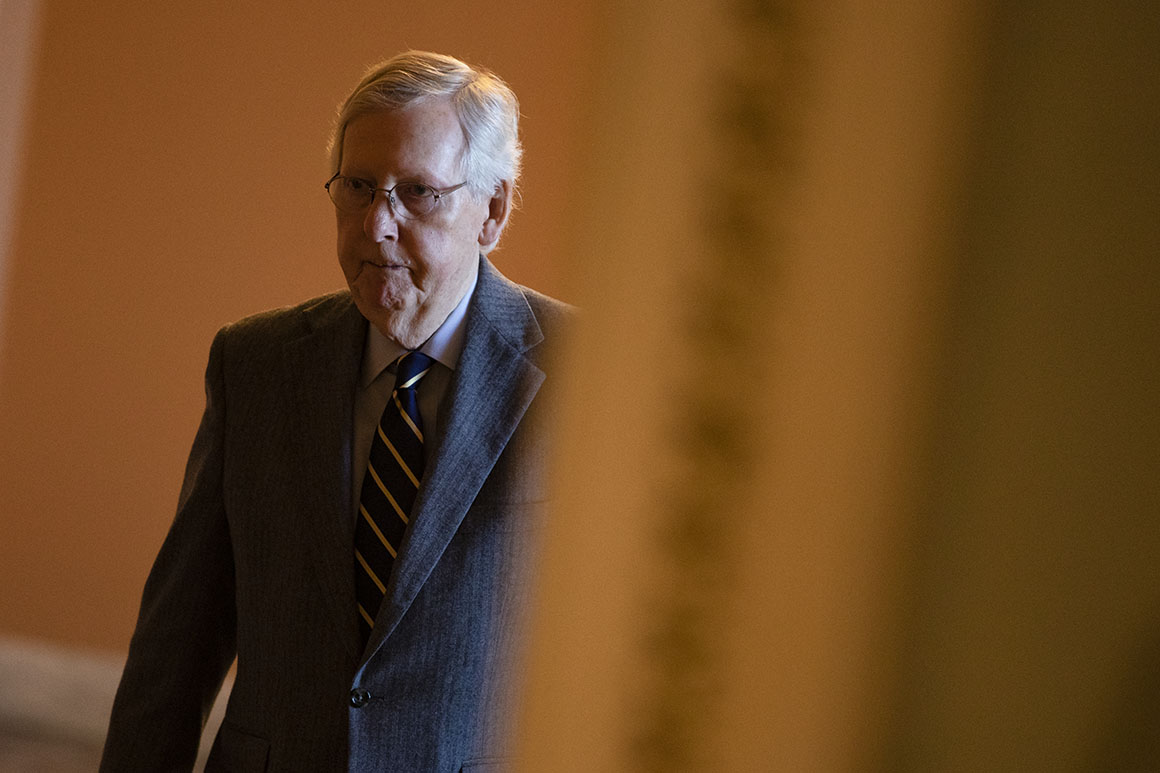
But McConnell didn’t weigh in on Ratcliffe’s qualifications to lead the country’s sprawling intelligence apparatus, and other Senate Republicans followed suit by asserting that they didn’t know much about the Trump loyalist who already once withdrew from consideration amid claims he exaggerated his resume.
“President Trump has a strong track record of sending the Senate impressive nominees for national security posts who are well prepared to protect our nation and defend our interests,” McConnell said on the Senate floor. “I hope Congressman Ratcliffe will impress senators just as did the other members of the president’s team and earn a bipartisan confirmation vote.”
McConnell said he looked forward to meeting Ratcliffe in person and expressed faith in the Senate Intelligence Committee’s ability to hold a “fair confirmation process.”
Many Senate Republicans reiterated Monday that they didn’t know much about Ratcliffe, a three-term conservative lawmaker — offering a similar response to when Trump first announced his intent to nominate him last year.
“I know very little about Congressman Ratcliffe,” Sen. Mitt Romney (R-Utah) said. “I will be looking into his background and record. But until I do, I really can’t comment on how I’ll vote on that.”
“I don’t know him, so I don’t have an opinion on that yet,” added Sen. Lamar Alexander (R-Tenn.).
Other senior Republicans offered a more encouraging response.
Sen. Roy Blunt (R-Mo.), a member of Senate GOP leadership who sits on the Intelligence Committee, said he backed the nomination and predicted Ratcliffe would be confirmed.
Sen. Richard Burr (R-N.C.), the chairman of the intelligence panel, also said Monday that he is fully supportive of Ratcliffe’s nomination and is optimistic that he can clear the 51-vote threshold in the Senate. He added that given Democratic opposition to Richard Grenell, the current acting intelligence chief, Ratcliffe now has an easier road to confirmation.
“I don’t think anybody changed their opinion of John Ratcliffe. What changed was the pathway to get somebody confirmed,” Burr said. “If Democrats want to vote against him and have Grenell stay on as acting until the end of the year, that’s fine with me.”
Trump installed Grenell, his ambassador to Germany, as acting DNI last month, replacing Joseph Maguire, who also served as acting intelligence chief since August. Democrats criticized the president for bypassing Congress by naming Grenell as an acting chief, particularly because Grenell lacks experience in the intelligence community.
Sen. Marco Rubio (R-Fla.), an Intelligence Committee member, appeared eager to move forward with the nomination, calling Ratcliffe “smart” and “intellectually capable,” while expressing concern about Grenell’s dual roles in Washington and Berlin.
“[Grenell] still holds the post in Germany, which eventually he either has to get back to or we’re going to have to put somebody else,” Rubio said. “You can’t have that post vacant. And you can’t do both jobs.”
Before Ratcliffe was nominated, Grenell was only able to serve through March 11 under federal vacancy laws. Now, Grenell — another fierce Trump ally — can stay on for months longer while Ratcliffe’s nomination is pending.
Trump reportedly forced Maguire out after an official working under him briefed the House Intelligence Committee on Russia’s purported efforts to aid Trump’s 2020 reelection bid.
Ratcliffe, a former U.S. attorney in Texas, served as a chief defender of the president during the House’s impeachment inquiry. As a member of both the Intelligence and Judiciary committees, he had a prominent role in the questioning of witnesses who spoke about allegations that Trump withheld military aid from Ukraine in order to pressure that country’s government to investigate Joe Biden.
Ratcliffe was also a member of Trump’s outside impeachment team during the Senate’s trial. The group included other close allies of the president, like Reps. Mark Meadows (R-N.C.) and Jim Jordan (R-Ohio).
Though Ratcliffe lacks a deep intelligence background, several Senate Republicans said such experience wasn’t necessary.
“I really haven’t looked closely at his — any intelligence cred. But in general, he seems like a guy that should do well at the job,” Sen. Mike Braun (R-Ind.) said in an interview. “That whole idea whether you need people who are steeped in experience versus somebody that’s just generally maybe good across the board — as the CEO of my own company, it wasn’t always a no-brainer to take somebody that had been around a long time.”
“I’m certainly not an intelligence expert. He may not be either, but he’s certainly a very good lawyer, good legislator, knows the bureaucracy and he’s got the trust of the president,” added Sen. Kevin Cramer (R-N.D.).
Sen. Susan Collins (R-Maine), a member of the Senate Intelligence Committee and a potential swing vote, has yet to weigh in on Ratcliffe’s latest nomination. Last year, Collins simply said she had not met him.
Trump announced last July that he would nominate Ratcliffe to succeed Maguire but never formally submitted the nomination to the Senate and pulled the pick days later amid reports that Ratcliffe had embellished aspects of his resume. At the time, Trump stood by Ratcliffe and said he was being treated “unfairly” by the news media.
Senate Democrats have indicated that they will oppose Ratcliffe, arguing that he does not have the necessary experience to serve in the role and is being picked because of his support for the president.
Senate Minority Leader Chuck Schumer (D-N.Y.) ripped Ratcliffe on Monday as an “alarmingly partisan choice” and urged Senate Republicans to reject his nomination.
“He was a fierce critic of the Mueller investigation, earned praise from deep-state conspiracy theorists,” Schumer said. “It is such a decline in America when this great agency, where people have risked their lives for America, quietly is made into a political football. … With this nomination, President Trump has shown again a lack of respect for the rule of law.”
Source: politico.com
See more here: news365.stream






